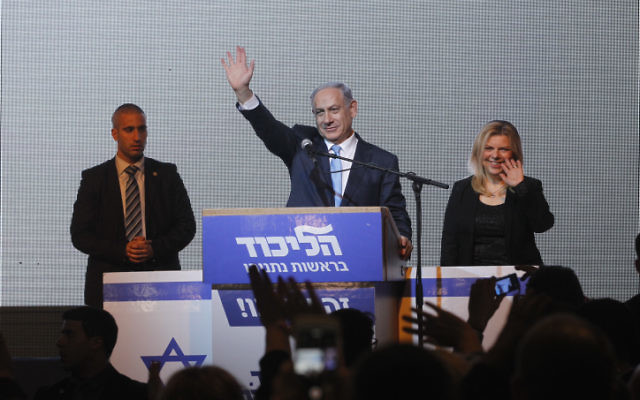Israel beyond the polemics
So another election has come and gone and while the anticipation of the results and what might transpire provided much fodder around the Shabbat table due in large part to the highly inaccurate polls, the actual results leave us pretty much where we started albeit with a cemented majority for Bibi, clipped wings for Bennett and Lieberman and an improved block of seats for the Labour party.
What is unique about such an election in this fraught region is that despite the antipathy some parties have towards each other, despite the polarising discourse in many parts of the community, the matter got settled at the ballot box.
The nonsense that is being published about democracy being the loser of this election is essentially from the sore loser camp. Indeed, if you are committed to democracy and uphold its principles, you must support the outcome of this election as it is the will of the majority of the electorate.
While it is true that Netanyahu and Likud ended up with 25 per cent of the seats and arguably not a mandate, those who voted for Bait Yehudi, Yisrael Beytenu, Kulanu and possibly Yesh Atid did so in the knowledge that the likely result was that Netanyahu would be the next prime minister. If disappointed with the majority of voters and disillusioned about what the future may hold, then call it that; it’s not however the demise of democracy.
In true democratic style if there is a groundswell of discontent, this Knesset’s term like many others, may be in for a short run. In the meantime, this Knesset will house its highest number of women members and its highest number of Arab members with an Arab member also in four non-Arab parties: Likud, Zionist Union, Yisrael Beytenu and Meretz.
Passions overflow and hyperbole tends to ensue from both ends of the political spectrum when one thinks, talks and writes about Israel. A fascinating book was published in Israel on the thirtieth anniversary of the Yom Kippur war and was translated into English in 2012 called “Letters to Talia”. It is a collection of letters from a young, female kibbutznik to a religious yeshiva boy and through the letters a friendship grows between them that could have otherwise not existed.
Both of them asked difficult and provocative questions of each other’s faith and world view which you can imagine was poles apart. The letters stop suddenly when tragedy strikes. What struck me when reading the letters was the preparedness of each young adult to enter into a dialogue with someone completely dissimilar from themselves.
They ask challenging questions of each other and while at times the debates are heated, each is prepared to contemplate and give consideration to the other’s point of view. The family and friends of the protagonists published the book in the hope that the divergent streams that make up the Jewish people see the benefit of communication rather than confrontation and antagonism as a means of persuasion or simply to assist in bridging the divide.
There’s little that’s more divisive than an election campaign. The temptation to do or say almost anything to get yourself over the line can leave a punter shuddering, wondering if the tectonic plates have really shifted so dramatically from the wake up alarm that morning. But an election campaign is not governing and it’s not government policy.
The Arab League chief Nabil Elaraby knew as much when he dismissed Netanyahu’s comment that has been reported as ruling out a Palestinian state if reelected, as electioneering. What is constructive about an election campaign is that it gets people talking and debating. And it’s important to be prepared to be exposed to perspectives not your own.
It’s too easy to curate your exposure to material that just mirrors your own world view. Not only is it too easy, it’s boring. Have you really reached a point where you believe there’s nothing left to learn?
Is there no opinion other than one that reflects your own stance, worth taking into account? Celebrated author and columnist, Ari Shavit wrote recently that the satiated left needs to leave the suburbs of northern Tel Aviv and discover the rest of the country, and the rest of the country needs to discover they don’t live on an island.
While Israel and its policies can provoke hardened views, critics of Israel from whatever persuasion need to uncloak their righteousness, demonstrate less of a need to conquer and be right at all costs and be open to a differing view. Israel like all countries is imperfect and messy but ultimately she is endeavouring to live up to the principles upon which she was founded: the natural right of the Jewish people to be masters of their own fate, a commitment to democracy and ensuring its borders are secure.
Surely someone who acknowledges that these principles are intrinsic to the future of the Jewish state is worth listening to, debating, and potentially reaching common ground.
On Yom Hazikaron and Yom Ha’atzmaut we come together on that common ground to remember and celebrate the founding and on-going miracle that is the State of Israel.
I look forward to seeing you there!
Author: Liora Miller is a board member of the Zionist Council of Victoria
The Zionist Council of Victoria invites the community to the following upcoming Yom Hazikaron and Yom Ha’atzmaut events:
Yom Hazikaron Commemoration, Tuesday 21 April 7:30pm, Robert Blackwood Hall, Monash University, Clayton
Yoms Transition Ceremony for Families, Wednesday 22 April 5:15pm, Beth Weizmann Community Centre
Yom Ha’atzmaut Concert, Wednesday 22 April 7:30pm, Melbourne Recital Centre, Southbank
Yom Ha’atzmaut Family Festival, Thursday 23 April 4-7pm, Beth Weizmann Community Centre


comments